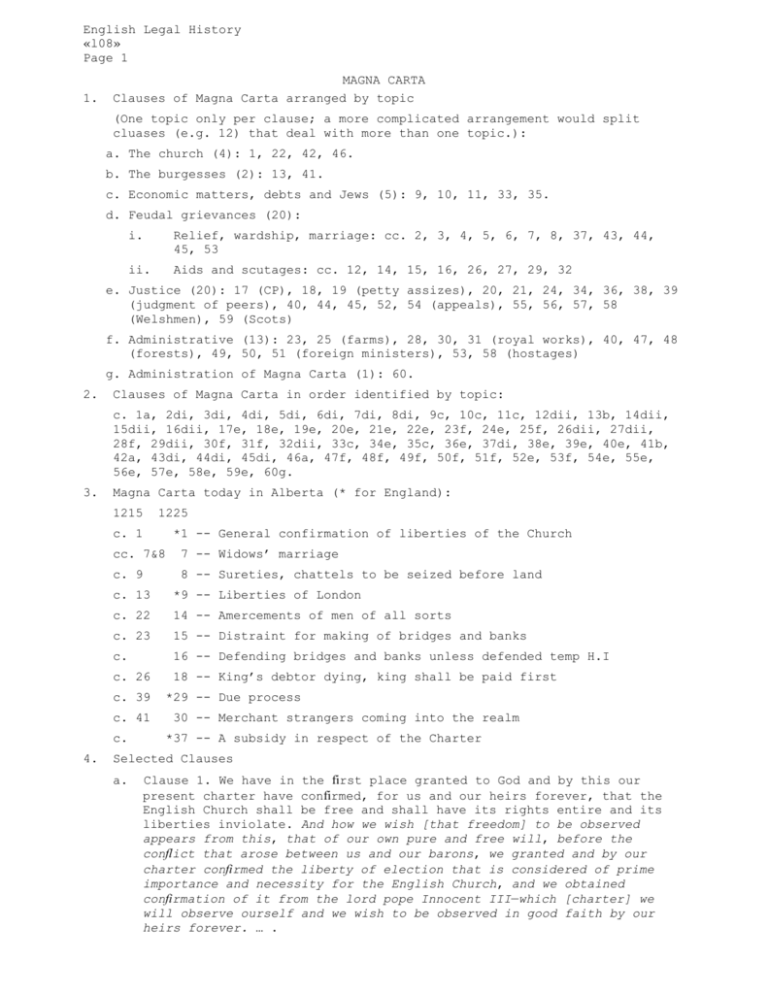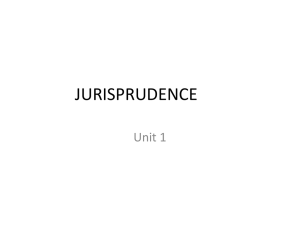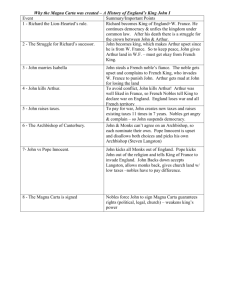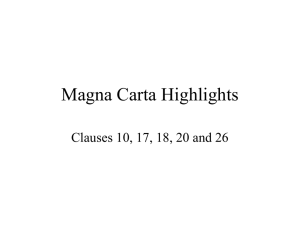this outline.
advertisement

English Legal History «l08» Page 1 1. MAGNA CARTA Clauses of Magna Carta arranged by topic (One topic only per clause; a more complicated arrangement would split cluases (e.g. 12) that deal with more than one topic.): a. The church (4): 1, 22, 42, 46. b. The burgesses (2): 13, 41. c. Economic matters, debts and Jews (5): 9, 10, 11, 33, 35. d. Feudal grievances (20): i. Relief, wardship, marriage: cc. 2, 3, 4, 5, 6, 7, 8, 37, 43, 44, 45, 53 ii. Aids and scutages: cc. 12, 14, 15, 16, 26, 27, 29, 32 e. Justice (20): 17 (CP), 18, 19 (petty assizes), 20, 21, 24, 34, 36, 38, 39 (judgment of peers), 40, 44, 45, 52, 54 (appeals), 55, 56, 57, 58 (Welshmen), 59 (Scots) f. Administrative (13): 23, 25 (farms), 28, 30, 31 (royal works), 40, 47, 48 (forests), 49, 50, 51 (foreign ministers), 53, 58 (hostages) g. Administration of Magna Carta (1): 60. 2. Clauses of Magna Carta in order identified by topic: c. 1a, 2di, 3di, 4di, 5di, 6di, 7di, 8di, 9c, 10c, 11c, 12dii, 13b, 14dii, 15dii, 16dii, 17e, 18e, 19e, 20e, 21e, 22e, 23f, 24e, 25f, 26dii, 27dii, 28f, 29dii, 30f, 31f, 32dii, 33c, 34e, 35c, 36e, 37di, 38e, 39e, 40e, 41b, 42a, 43di, 44di, 45di, 46a, 47f, 48f, 49f, 50f, 51f, 52e, 53f, 54e, 55e, 56e, 57e, 58e, 59e, 60g. 3. Magna Carta today in Alberta (* for England): 1215 1225 c. 1 cc. 7&8 7 -- Widows’ marriage c. 9 8 -- Sureties, chattels to be seized before land c. 13 *9 -- Liberties of London c. 22 14 -- Amercements of men of all sorts c. 23 15 -- Distraint for making of bridges and banks c. 16 -- Defending bridges and banks unless defended temp H.I c. 26 18 -- King’s debtor dying, king shall be paid first c. 39 c. 41 c. 4. *1 -- General confirmation of liberties of the Church *29 -- Due process 30 -- Merchant strangers coming into the realm *37 -- A subsidy in respect of the Charter Selected Clauses a. Clause 1. We have in the first place granted to God and by this our present charter have confirmed, for us and our heirs forever, that the English Church shall be free and shall have its rights entire and its liberties inviolate. And how we wish [that freedom] to be observed appears from this, that of our own pure and free will, before the conflict that arose between us and our barons, we granted and by our charter confirmed the liberty of election that is considered of prime importance and necessity for the English Church, and we obtained confirmation of it from the lord pope Innocent III—which [charter] we will observe ourself and we wish to be observed in good faith by our heirs forever. … . English Legal History «l08» Page 2 b. Clause 9: And the city of London shall have all its ancient liberties and free customs both by land and by water. Besides we will and grant that all the other cities, boroughs, towns, and ports shall have all their liberties and free customs. c. Clause 35: There shall be one measure of wine throughout our entire kingdom, and one measure of ale; also one measure of grain, namely the quarter of London; and one width of dyed cloth, russet [cloth], and hauberk [cloth], namely, two yards between the borders. With weights, moreover, it shall be as with measures. d. Clause 2: If any one of our earls or barons or other men holding of us in chief dies, and if when be dies his heir is of full age and owes relief [that heir] shall have his inheritance for the ancient relief: namely the heir or heirs of an earl £100 for the whole barony of an earl the heir or heirs of a baron £100 for a whole barony, the heir or heirs of a knight 100s. at most for a whole knight’s fee. And let whoever owes less give less, according to the ancient custom of fiefs. e. Clause 7: A widow shall have her marriage portion (maritagium) and inheritance (hereditatem) immediately after the death of her husband and without difficulty; nor shall she give anything for her dow[er] (dos) or for her marriage portion or for her inheritance—which inheritance she and her husband were holding on the day of that husband’s death. And after his death she shall remain in the house [1225: principal dwelling] of her husband for forty days, within which her dow[er] shall be assigned to her. [1225 adds: unless it has been assigned to her earlier, or unless that house is a castle. And if she leaves the castle, she shall at once be provided with a suitable house in which she may honourably dwell until her dow[er] is assigned to her as aforesaid. … Moreover, she shall be assigned as dow[er] one-third of all the land held by her husband during his lifetime, unless she was endowed with less at the church door.” f. Clause 18. Assizes of novel disseisin, of mort d’ancestor, and of darrein presentment shall be held only in their counties [of origin] and in this way: we, or our chief justice if we are out of the kingdom, will send two justices through each county four times a year; and they, together with four knights of each county elected by the county [court], shall hold the aforesaid assizes in the county, on the day and at the place [set for the meeting] of the county [court]. g. Clause 17. Common pleas shall not follow our court, but shall be held in some definite place. h. Clause 24. No sheriff, constable, coroner, or other bailiff of ours shall hold the pleas of our crown. i. Clause 34. Henceforth the writ called praecipe shall not be issued for any one concerning any tenement whereby a freeman may lose his court. j. Clause 39. No freeman (nullus liber homo) shall be captured or imprisoned or disseised or outlawed or exiled or in any way destroyed, nor will we go against him or send against him, except by the lawful judgment of his peers or by the law of the land.







